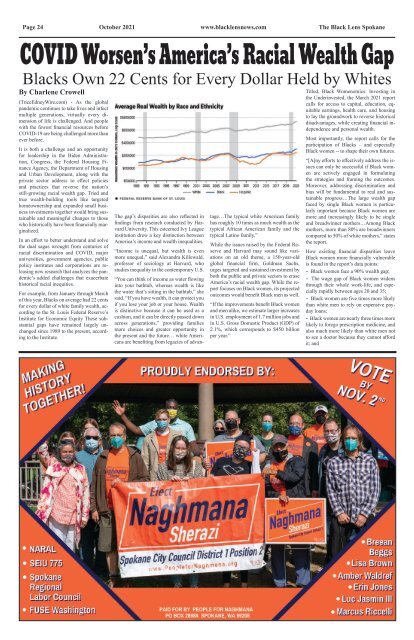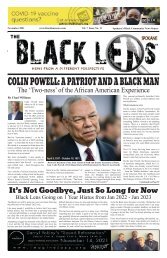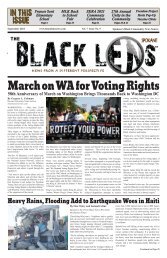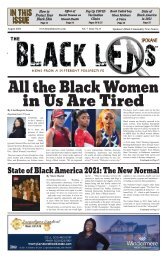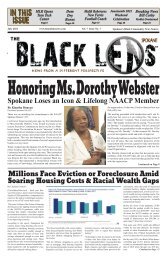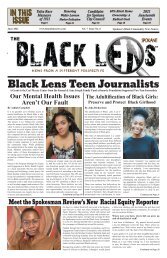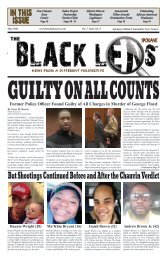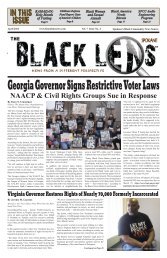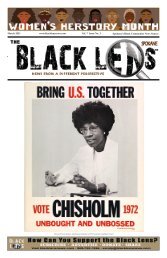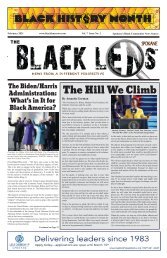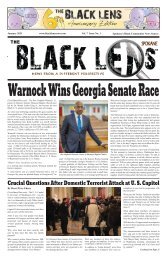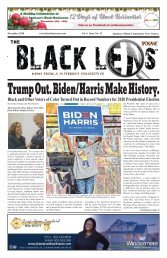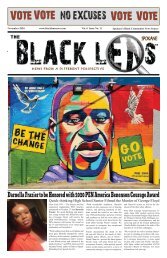Black Lens - October 2021
The Black Lens in an independent , community newspaper, published monthly and based in Spokane, WA, that covers then news, people, information and issues that are of importance to the Black community.
The Black Lens in an independent , community newspaper, published monthly and based in Spokane, WA, that covers then news, people, information and issues that are of importance to the Black community.
You also want an ePaper? Increase the reach of your titles
YUMPU automatically turns print PDFs into web optimized ePapers that Google loves.
Page 24<br />
<strong>October</strong> <strong>2021</strong><br />
www.blacklensnews.com<br />
The <strong>Black</strong> <strong>Lens</strong> Spokane<br />
COVID Worsen’s America’s Racial Wealth Gap<br />
<strong>Black</strong>s Own 22 Cents for Every Dollar Held by Whites<br />
By Charlene Crowell<br />
(TriceEdneyWire.com) - As the global<br />
pandemic continues to take lives and infect<br />
multiple generations, virtually every dimension<br />
of life is challenged. And people<br />
with the fewest financial resources before<br />
COVID-19 are being challenged more than<br />
ever before.<br />
It is both a challenge and an opportunity<br />
for leadership in the Biden Administration,<br />
Congress, the Federal Housing Finance<br />
Agency, the Department of Housing<br />
and Urban Development, along with the<br />
private sector address to effect policies<br />
and practices that reverse the nation’s<br />
still-growing racial wealth gap. Tried and<br />
true wealth-building tools like targeted<br />
homeownership and expanded small business<br />
investments together would bring sustainable<br />
and meaningful changes to those<br />
who historically have been financially marginalized.<br />
In an effort to better understand and solve<br />
the dual sagas wrought from centuries of<br />
racial discrimination and COVID, major<br />
universities, government agencies, public<br />
policy institutes and corporations are releasing<br />
new research that analyzes the pandemic’s<br />
added challenges that exacerbate<br />
historical racial inequities.<br />
For example, from January through March<br />
of this year, <strong>Black</strong>s on average had 22 cents<br />
for every dollar of white family wealth, according<br />
to the St. Louis Federal Reserve’s<br />
Institute for Economic Equity These substantial<br />
gaps have remained largely unchanged<br />
since 1989 to the present, according<br />
to the Institute.<br />
The gap’s disparities are also reflected in<br />
findings from research conducted by Harvard<br />
University. This esteemed Ivy League<br />
institution drew a key distinction between<br />
America’s income and wealth inequalities.<br />
“Income is unequal, but wealth is even<br />
more unequal,” said Alexandra Killewald,<br />
professor of sociology at Harvard, who<br />
studies inequality in the contemporary U.S.<br />
“You can think of income as water flowing<br />
into your bathtub, whereas wealth is like<br />
the water that’s sitting in the bathtub,” she<br />
said. “If you have wealth, it can protect you<br />
if you lose your job or your house. Wealth<br />
is distinctive because it can be used as a<br />
cushion, and it can be directly passed down<br />
across generations,” providing families<br />
more choices and greater opportunity in<br />
the present and the future… white Americans<br />
are benefiting from legacies of advantage…The<br />
typical white American family<br />
has roughly 10 times as much wealth as the<br />
typical African American family and the<br />
typical Latino family.”<br />
While the issues raised by the Federal Reserve<br />
and Harvard may sound like variations<br />
on an old theme, a 150-year-old<br />
global financial firm, Goldman Sachs,<br />
urges targeted and sustained investment by<br />
both the public and private sectors to erase<br />
America’s racial wealth gap. While the report<br />
focuses on <strong>Black</strong> women, its projected<br />
outcomes would benefit <strong>Black</strong> men as well.<br />
“If the improvements benefit <strong>Black</strong> women<br />
and men alike, we estimate larger increases<br />
in U.S. employment of 1.7 million jobs and<br />
in U.S. Gross Domestic Product (GDP) of<br />
2.1%, which corresponds to $450 billion<br />
per year.”<br />
Titled, <strong>Black</strong> Womenomics: Investing in<br />
the Underinvested, the March <strong>2021</strong> report<br />
calls for access to capital, education, equitable<br />
earnings, health care, and housing<br />
to lay the groundwork to reverse historical<br />
disadvantages, while creating financial independence<br />
and personal wealth.<br />
Most importantly, the report calls for the<br />
participation of <strong>Black</strong>s – and especially<br />
<strong>Black</strong> women -- to shape their own futures.<br />
“[A]ny efforts to effectively address the issues<br />
can only be successful if <strong>Black</strong> women<br />
are actively engaged in formulating<br />
the strategies and framing the outcomes.<br />
Moreover, addressing discrimination and<br />
bias will be fundamental to real and sustainable<br />
progress…The large wealth gap<br />
faced by single <strong>Black</strong> women is particularly<br />
important because <strong>Black</strong> women are<br />
more and increasingly likely to be single<br />
and breadwinner mothers…Among <strong>Black</strong><br />
mothers, more than 80% are breadwinners<br />
compared to 50% of white mothers,” states<br />
the report.<br />
How existing financial disparities leave<br />
<strong>Black</strong> women more financially vulnerable<br />
is found in the report’s data points:<br />
. <strong>Black</strong> women face a 90% wealth gap;<br />
. The wage gap of <strong>Black</strong> women widens<br />
through their whole work-life, and especially<br />
rapidly between ages 20 and 35;<br />
. <strong>Black</strong> women are five times more likely<br />
than white men to rely on expensive payday<br />
loans;<br />
. <strong>Black</strong> women are nearly three times more<br />
likely to forego prescription medicine, and<br />
also much more likely than white men not<br />
to see a doctor because they cannot afford<br />
it; and


